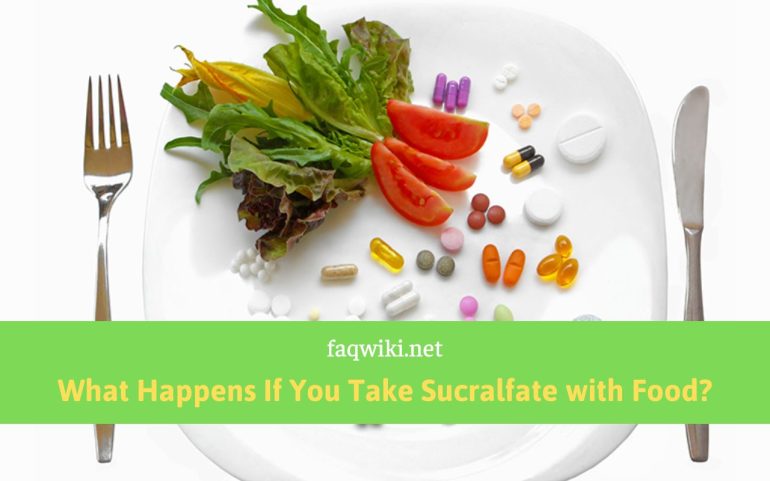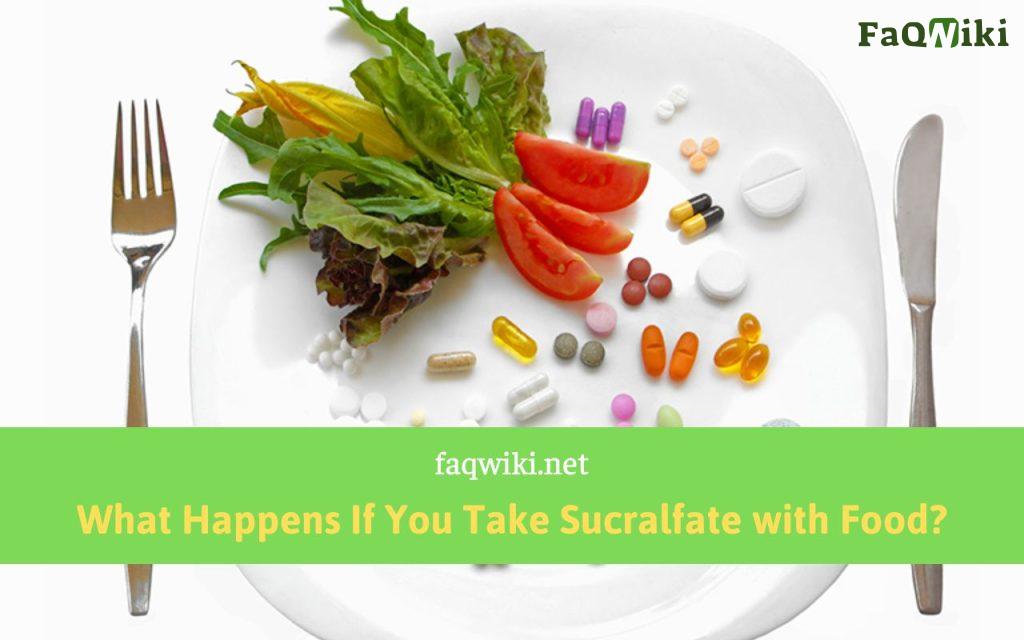What Happens If You Take Sucralfate with Food? Exploring the Effects and Risks

What Happens If You Take Sucralfate with Food? Sucralfate is a medication used to treat a variety of gastrointestinal disorders, including ulcers, gastroesophageal reflux disease (GERD), and gastritis. It works by forming a protective barrier over ulcers, preventing further damage and allowing them to heal. However, there is some controversy over whether sucralfate should be taken with food.

What Happens If You Take Sucralfate with Food
Understanding Sucralfate
Sucralfate is a medication that forms a sticky, protective barrier over ulcers and other damaged areas in the gastrointestinal tract. It does not neutralize stomach acid, but instead protects the underlying tissue from further damage by acid and other digestive substances.
Sucralfate is not absorbed into the bloodstream and is excreted primarily in the feces. This means that it does not have systemic effects like other medications, but instead works directly on the areas where it is applied.
Sucralfate is primarily used to treat ulcers in the stomach and intestines, as well as GERD and gastritis. It may also be used off-label to treat other gastrointestinal conditions, such as inflammatory bowel disease.
The Importance of Food in Digestion
Food plays a crucial role in the digestive process. When we eat, our bodies break down the food into its component parts, including proteins, fats, and carbohydrates. These components are then absorbed into the bloodstream and used by the body for energy and other functions.
The presence of food in the stomach can also impact the absorption of medications. Some medications are absorbed more quickly or effectively when taken with food, while others may be absorbed more slowly or incompletely.
Should You Take Sucralfate with Food?
There is some controversy over whether sucralfate should be taken with food. Some experts recommend taking sucralfate on an empty stomach to maximize its effectiveness, while others suggest taking it with food to reduce the risk of gastrointestinal side effects.
Research on the topic is limited, but one study found that taking sucralfate with food may reduce its effectiveness in treating ulcers. However, other studies have found no significant difference in effectiveness between taking sucralfate with or without food.
Ultimately, the decision of whether to take sucralfate with food should be made on a case-by-case basis in consultation with a healthcare provider.
Best Practices for Taking Sucralfate with Food
If a healthcare provider recommends taking sucralfate with food, there are some guidelines to follow. Sucralfate should be taken at least one hour before or two hours after a meal to minimize the impact of food on its absorption.
Certain foods and beverages may also impact the absorption of sucralfate. Calcium-rich foods, such as milk and cheese, may decrease the effectiveness of sucralfate and should be avoided when taking the medication. Additionally, antacids and other medications that neutralize stomach acid may also interfere with the absorption of sucralfate and should be avoided.
Interactions with Other Medications
Sucralfate may interact with other medications, particularly those that are absorbed in the stomach or intestines. Some medications may be absorbed less effectively when taken with sucralfate, while others may have their absorption enhanced.
If taking sucralfate with other medications, it is important to consult with a healthcare provider to ensure there are no interactions that could impact the effectiveness of either medication.
Side Effects of Sucralfate
Sucralfate is generally well-tolerated, but like all medications, it can
have side effects. The most common side effect of sucralfate is constipation, which can be managed with dietary changes, increased fluid intake, and over-the-counter laxatives.
Less common side effects include nausea, vomiting, dry mouth, dizziness, and headache. These side effects are usually mild and go away on their own, but if they persist or worsen, it is important to contact a healthcare provider.
Conclusion
In conclusion, sucralfate is a medication used to treat a variety of gastrointestinal disorders, including ulcers, GERD, and gastritis. There is some controversy over whether sucralfate should be taken with food, but ultimately, the decision should be made on a case-by-case basis in consultation with a healthcare provider.
If taking sucralfate with food, it should be taken at least one hour before or two hours after a meal to minimize the impact of food on its absorption. Calcium-rich foods and antacids should be avoided when taking sucralfate to ensure maximum effectiveness.
As with all medications, sucralfate may interact with other medications and have side effects. It is important to consult with a healthcare provider if experiencing any concerning symptoms.
FAQs
Can I take sucralfate with antacids?
- It is not recommended to take sucralfate with antacids, as antacids may interfere with its absorption.
Can sucralfate cause constipation?
- Yes, constipation is a common side effect of sucralfate, but can be managed with dietary changes and over-the-counter laxatives.
How long should I wait to eat after taking sucralfate?
- If taking sucralfate with food, it should be taken at least one hour before or two hours after a meal to minimize the impact of food on its absorption.
What are the side effects of sucralfate?
- The most common side effect of sucralfate is constipation, but other side effects may include nausea, vomiting, dry mouth, dizziness, and headache.
Can sucralfate be used to treat conditions other than ulcers and GERD?
- Sucralfate is primarily used to treat ulcers and GERD, but may also be used off-label to treat other gastrointestinal conditions, such as inflammatory bowel disease.
